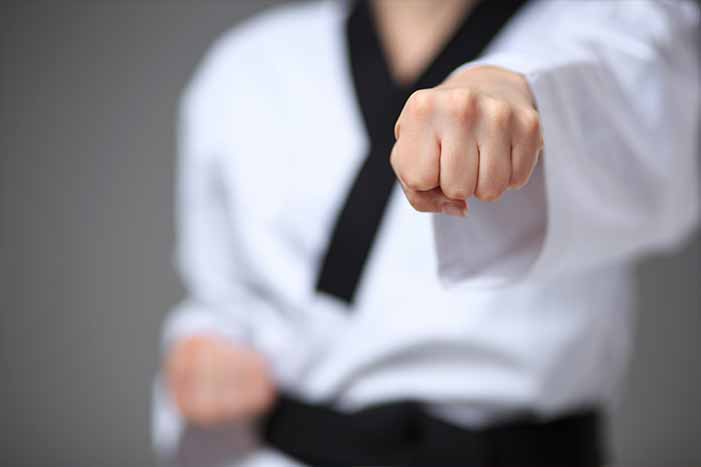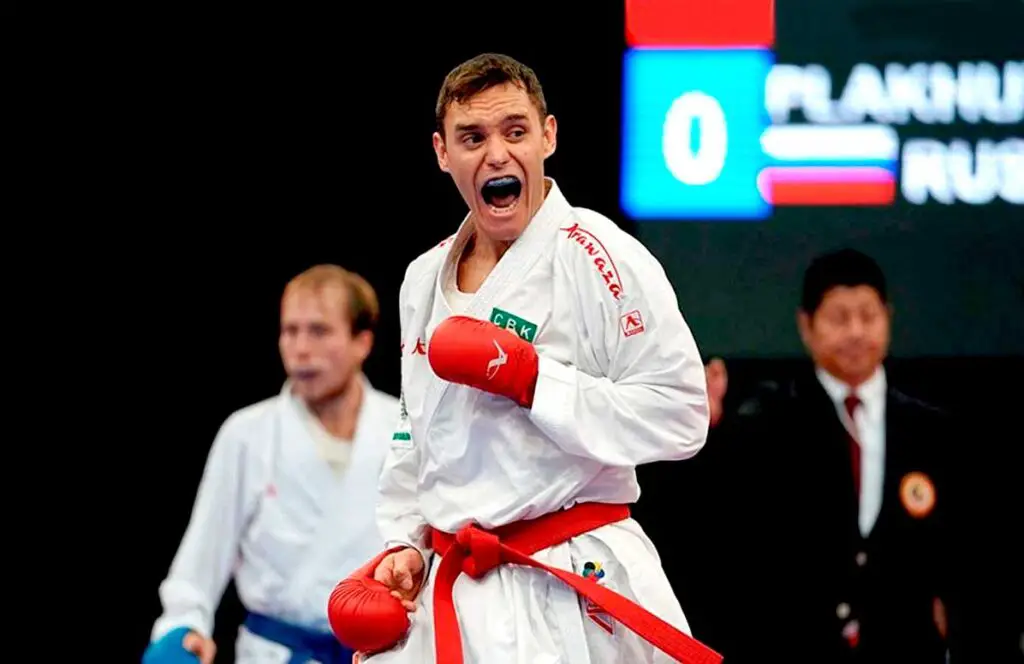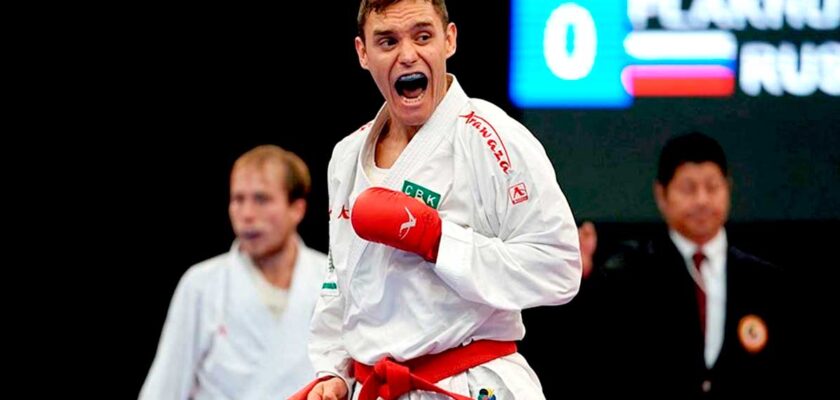In the late 1950s and early 1960s, karate was introduced in Brazil, but faced strong resistance and suspicion from the Brazilian authorities. The stigma attached to Japanese martial arts at the time made it difficult for karate to establish itself as a respectable and popular sport.
Despite this, throughout the 1970s and 1980s, karate began to gain ground, driven by the tireless work of great masters and pioneers such as Ryuzo Watanabe, Massatoshi Nakayama and Takashi Yamauchi, who are also recognized as some of the best brazilian male karatekas of all time.

Best Brazilian male karatekas of all time/master1305/iStock
In 2021, the sport earned its place at the Tokyo Olympics, a milestone that helped raise its profile and spark renewed interest in karate around the world. This historic inclusion also served to recognize the talent and dedication of the best Brazilian male karatekas of all time, who continue to be a source of inspiration for the global karate community.

Douglas Brose/WKF
However, as in any trajectory, the history of karate in Brazil is marked by periods of challenges and overcoming, reflecting the ups and downs faced along the way. Even so, the best Brazilian male karatekas of all time have demonstrated an unwavering determination and an unbreakable commitment to the development and promotion of karate on Brazilian soil and beyond.
Participate in our free community on Whatsapp and receive daily tips, news and curiosities from more than 50 sports! Click here< to join.
Do you want to know more about the history of the best Brazilian male karatekas of all time? Then come with us!
Learn more about the best Brazilian male karatekas of all time
Douglas Brouse
Born in Cruz Alta, Rio Grande do Sul, Douglas Brose took his first steps into the world of karate at the age of seven. His remarkable sporting CV boasts three gold medals in the kumite discipline up to 60 kg at the World Karate Championships, as well as having reached the top step of the podium at the 2009 World Games and the 2015 Pan American Games. With eight titles won at the Pan-American Karate Championships, Brose has solidified his position as one of the main references in the world of sport.
Recently retired, he ended his competitive career after his last participation in the Pan American Games in Santiago, Chile, at the end of 2023.
Ronaldo Carlos
During the 1970s, Ronaldo Carlos da Silva consistently dominated the martial arts scene in Brazil. Known by the nickname Ronaldão, he was renowned for possessing the most powerful Guiaku-Tsuki of the time. Feared by his opponents in the dojôs and competition arenas, Ronaldo won the title of two-time Brazilian champion, Pan-American champion and eight-time Rio de Janeiro champion. He was also one of the pioneers to integrate karate into the vale-tudo (MMA) scene.
Chinzô Machida
Born in Belém, Pará, Chinzô Machida is an outstanding Mixed Martial Arts (MMA) fighter. He has practiced Shotokan-style karate since the age of 4. Competing in the featherweight category, Machida is 1.80m tall and weighs 65kg. He made his professional MMA debut in 2005.
His fighting method is characterized by long-distance combat, carefully selecting his blows and using the space between him and his opponent as a form of defense to launch counterattacks with direct punches. Chinzô is known for being a five-time Brazilian individual kumite champion, the record holder in the category.
Ewerton Teixeira
Ewerton Teixeira is considered one of the best Brazilian male karatekas of all time. Born in São Paulo, he fell in love with kyokushin at the age of nine and achieved his black belt at the age of 21. In 2001, Teixeira was already celebrating his first Americas Champion title, a title he would go on to win four more times.
His most prestigious victory came in 2007 at the World Open, where he defeated Jan Soukup in the final. After this achievement, Teixeira decided to expand his horizons, moving to K-1, a renowned kickboxing organization.
Luiz Watanabe
Luiz Watanabe, born on July 28, 1947 in Hokkaido, Japan, arrived in Brazil in the late 1950s, where he became a naturalized Brazilian. He trained with the respected sensei Nakaiama in Japan before becoming world champion in 1972. His work as coach of the Brazilian Traditional Karate-do National Team was marked by excellent results.
He was also an active member of the ITKF Technical Commission and International Refereeing Coordinator.
Sensei Watanabe was a unique figure, known for his instinctive thinking and innovative approaches. He lived in Setiba (ES), where he had his own dojo for training, until his death.
Fernando Athayde
Fernando Athayde stood out in the Brazilian national team at the 1978 Pan-American Games in Canada, where he was an integral part of the kumite team that won the title. A student of Sensei Takeushi, Fernando was known for his Hangetsu Kata and for a kumite characterised by refined technique and a strong fighting spirit.
Fernando was also a champion in Rio de Janeiro and competed in two World Championships as part of the prestigious “Golden Generation” of Brazilian karate, who left an indelible mark on the sport.
Dorival Caribé
Dorival was one of the precursors of karate in Bahia, where he was born, along with his brother Denilson. Caribé made history by becoming the first Brazilian karate champion in 1969. The fighter also accompanied the Brazilian team at the 1972 and 1977 World Championships (France and Japan), and also at the Pan-American Games in 1973 and 1974 (Brazil and Peru). Dorival was considered one of the best Brazilian male karatekas of all time.
Ricardo Buzzi
Ricardo Luis Buzzi graduated in architecture from the Pontifical Catholic University of Paraná and was a karate practitioner. Recognized nationally and internationally as one of the most skilled and versatile karateka of his generation, he competed in several events, accumulating titles in various categories. These include the ITKF individual kumite World Champion title in 2002, as well as having won 12 Brazilian champion titles, 5 of which were team titles and 7 individual titles, from the CBKT.
In 2014, after winning the unprecedented title of Individual Kumite Champion for a man from Paraná at the Brazilian Championship, he ended his career as an athlete at the age of 38.
Lyoto Machida
Lyoto Carvalho Machida, also known as “Dragon”, was born in Salvador on May 30, 1978. He is a Brazilian karate practitioner and professional MMA fighter. Machida is a two-time UFC Middleweight World Champion. Raised in Belém, the capital of Pará, Lyoto is the son of karate master Yoshizo Machida. From the age of three, he began training with his father, who developed a training methodology based on the Shotokan Karate style, now known as Machida Karate.
At the age of 13, Lyoto achieved his black belt. He also started practicing sumo at the age of 12 and Brazilian Jiu-Jitsu at the age of 15. Throughout his journey, he won several amateur karate tournaments, including the Pan-American Karate tournament in 2001.
Vinícius Rezende
Vinícius Rezende Figueira is a talented karate practitioner from Brazil, notable for his bronze medal at the Lima 2019 Pan American Games in the up to 67kg category. In 2018, he was runner-up at the World Championships in Madrid, after a fierce final against Frenchman Steven Acosta, which ended with a score of 6-5.
Vinícius recently added another achievement to his CV by winning the gold medal at the World Games. He currently leads the special senior ranking of the Brazilian Karate Confederation in the Senior Men’s Kumite category up to 67kg.
Complete list of the best Brazilian male karatekas of all time
- Douglas Brose
- Ronaldo Carlos
- Chinzô Machida
- Ewerton Teixeira
- Ryuzo Watanabe
- Fernando Athayde
- Dorival Caribé
- Ricardo Buzzi
- Lyoto Machida
- Vinicius Figueira
These remarkable fighters not only helped to spread and improve karate in Brazil, but also left a legacy as the best Brazilian male karatekas of all time. Their contributions were fundamental in raising the status of karate in the country and inspiring future generations of practitioners.
Did you like our list of the best Brazilian male karatekas of all time? You might also like it:



